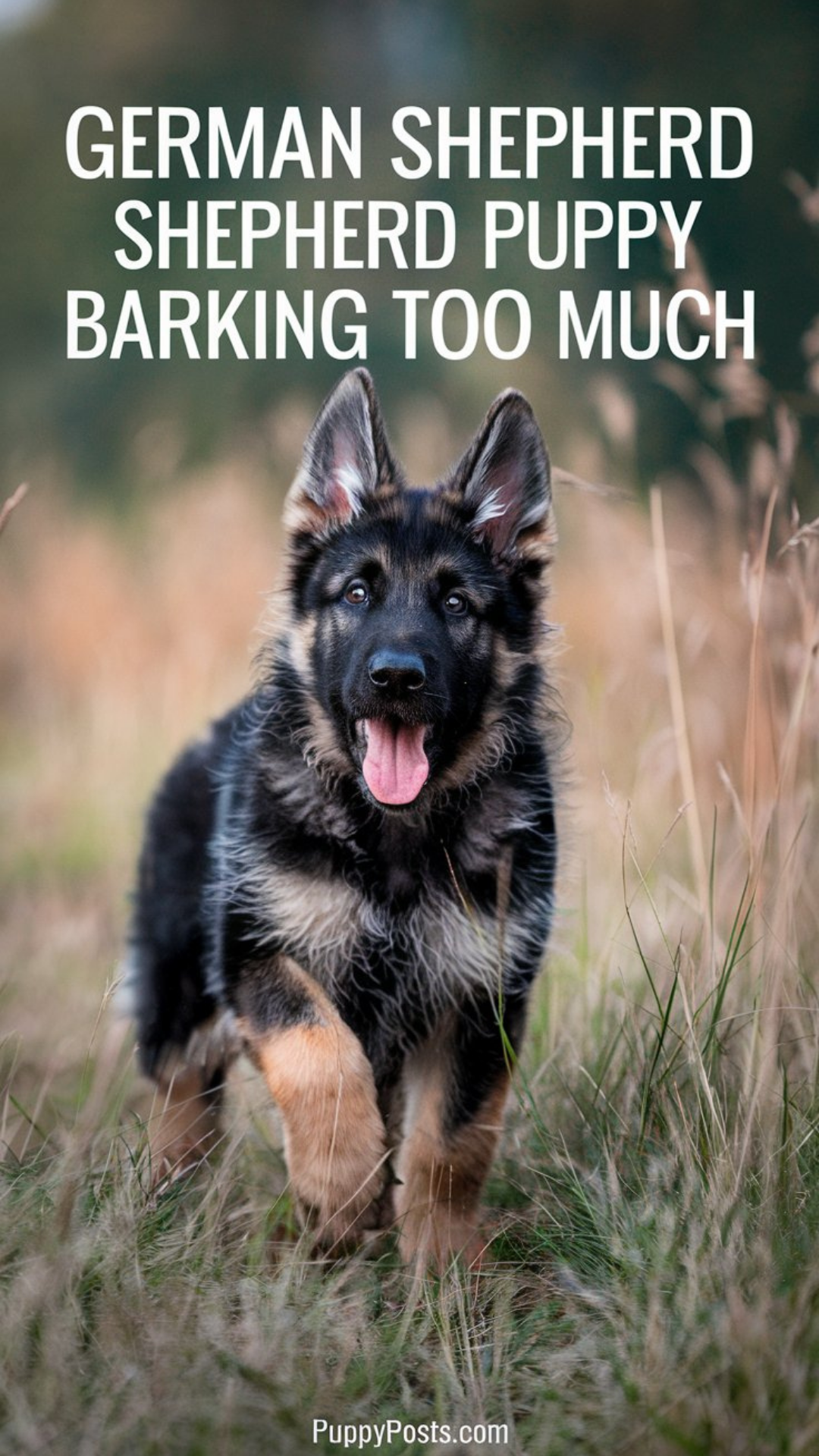German Shepherd puppy barking too much
Alright, let’s talk about that German Shepherd puppy of yours and the noise it’s making. I get it, they’re adorable, full of energy, and smart as a whip. But if that little furball sounds like a broken alarm clock, you’ve got a problem brewing that you need to nip in the bud. As a vet with ten years under my belt, running my sanctuary here in Jersey, I’ve seen enough German Shepherds with a barking problem to tell you this: they’re vocal dogs by nature, but excessive barking ain’t cute, and it sure as heck ain’t gonna get better on its own. You ignore this, and you’re gonna have a full-grown barking machine, and nobody wants that. So, let’s get serious about quieting that pup.

Alright, let’s talk about that German Shepherd puppy of yours and the noise it’s making. I get it, they’re adorable, full of energy, and smart as a whip. But if that little furball sounds like a broken alarm clock, you’ve got a problem brewing that you need to nip in the bud. As a vet with ten years under my belt, running my sanctuary here in Jersey, I’ve seen enough German Shepherds with a barking problem to tell you this: they’re vocal dogs by nature, but excessive barking ain’t cute, and it sure as heck ain’t gonna get better on its own. You ignore this, and you’re gonna have a full-grown barking machine, and nobody wants that. So, let’s get serious about quieting that pup.
Why Your Pup’s Got a Big Mouth: Understanding the Bark
First off, you gotta figure out why that little Land Shark is barking. It’s not just to annoy you, usually. They’re communicating, even if it’s obnoxious.
- Boredom & Lack of Mental Stimulation: This is a big one for German Shepherds. These dogs are thinkers. If their brains ain’t working, they’ll find their own “job,” and barking at everything that moves (or doesn’t move) is an easy one.
- Attention-Seeking: If every time your puppy barks, you go to them, pick them up, or even yell at them, guess what? You’re rewarding the barking. Any attention is good attention to a puppy.
- Fear or Anxiety: New sounds, new people, being left alone (separation anxiety) can all trigger fear barking. Sometimes they’re scared, sometimes they’re just protesting.
- Frustration: They want something they can’t have – a toy, to go outside, to get to another dog. That “I want it!” bark can be loud.
- Guard Instincts: Even as puppies, German Shepherds have protective instincts. They might be barking at passersby, the mailman, or noises outside, thinking they’re defending their turf.
- Excitement: Sometimes, they’re just over-the-top happy and can’t contain it. This usually happens during playtime or when you come home.
Shutting Down the Noise: Practical Training Steps
Once you understand why they’re barking, you can address it. This ain’t magic, it’s consistent training and clear boundaries.
- First, See a Vet (Me, or your Local One!): Seriously, rule out medical issues. Sometimes, pain or discomfort can make a puppy irritable and prone to excessive vocalization. Don’t skip this step.
- Increase Mental & Physical Exercise (Smartly!): If it’s boredom, you gotta fix it. For a German Shepherd puppy, this means short, frequent training sessions (5-10 minutes, multiple times a day) working on “Look at me!”, “Sit,” “Down,” “Stay,” and puzzle toys. Combine that with appropriate physical play (controlled fetch, gentle walks – check vet on vaccine status for outdoor walks) that tires them out without overworking growing joints. A tired brain and body bark less.
- Teach “Quiet!”: This is a specific command.
- Let your puppy bark a few times.
- Hold a high-value treat near their nose to get their attention.
- The instant they are quiet, say “Quiet!” (or “Shush!”).
- Reward them immediately with the treat and calm praise.
- Gradually increase the duration of silence before the reward. If they start barking again, remove the treat and try again. The key is to reward the silence, not the barking.
- Ignore Attention-Seeking Barking: This is tough, but crucial. If your puppy barks for attention, turn your back. Walk away. Don’t make eye contact, don’t talk to them, don’t touch them. The instant they are quiet for a few seconds, then you can reward them with attention. It teaches them barking doesn’t work.
- Manage the Environment: If your puppy is barking at every person or dog walking by the window, limit their view. Close the curtains or put up a privacy film. If they’re barking at outdoor noises, use white noise or play calming music. Reduce the triggers when you can’t actively train.
- Crate Training for Calmness: A properly crate-trained puppy sees their crate as a safe, quiet den. If your puppy is barking out of anxiety or over-excitement when alone, a comfortable crate can provide a secure space where they feel safe and are less likely to react to outside stimuli. Don’t use it for punishment.
My Jersey Wisdom: Consistency and Leadership
Listen up. You’ve got a German Shepherd puppy. These dogs are powerful, intelligent, and they need consistent rules and clear, calm leadership. If you’re wishy-washy, they’ll step right up and take charge, and then the barking problem will be the least of your worries. Use positive reinforcement – good treats, praise, and appropriate play. Never yell at your puppy for barking, or hit them, or use a shock collar. That will only teach them to be afraid, or worse, make the barking worse because they associate you with negative things.
This isn’t an overnight fix. It takes patience, consistency, and a strong understanding of what your German Shepherd puppy needs. You put the work in now, you address that barking calmly and correctly, and you’ll raise a confident, quiet, and truly loyal companion. And that, my friend, is a promise.







